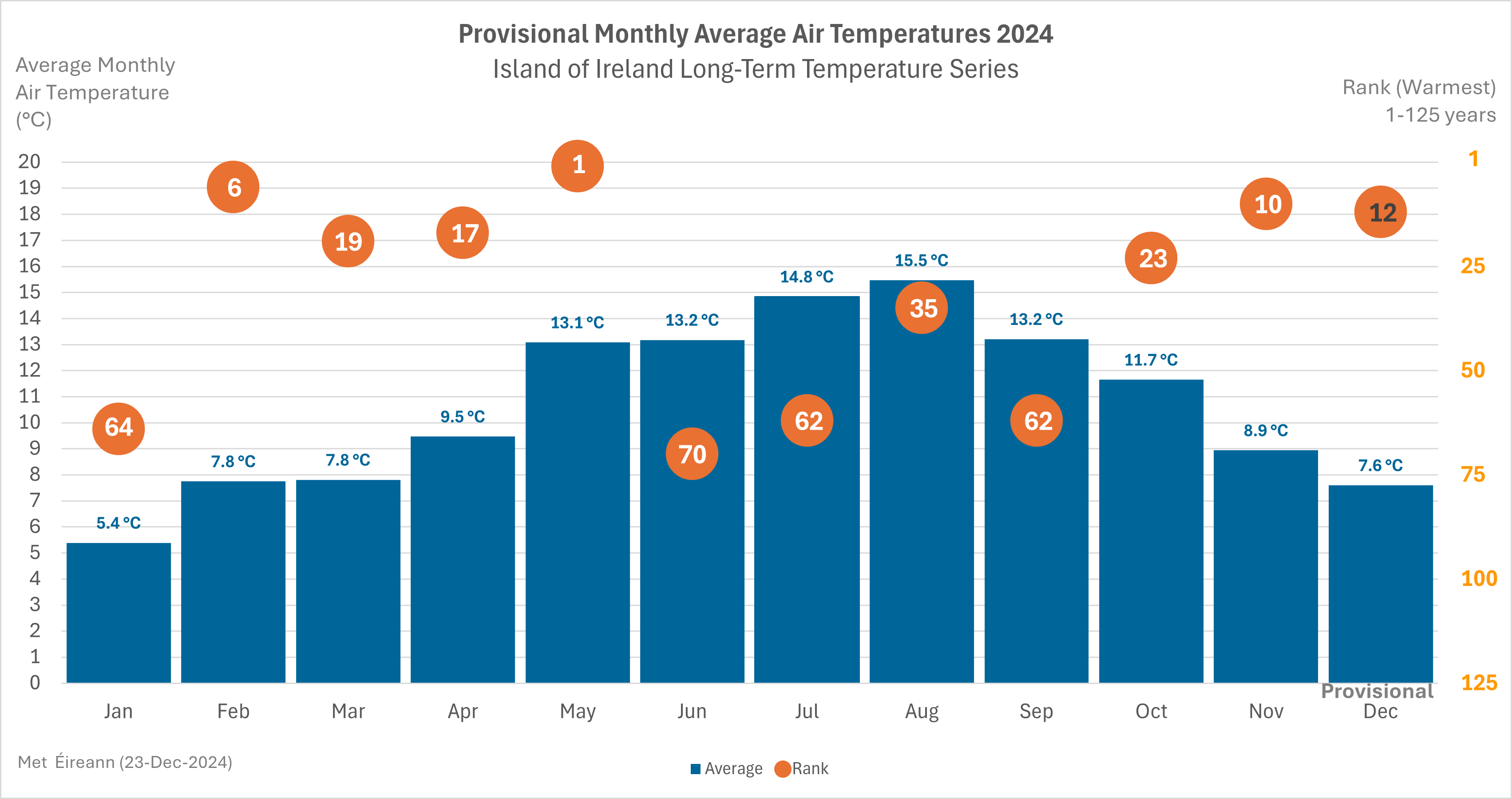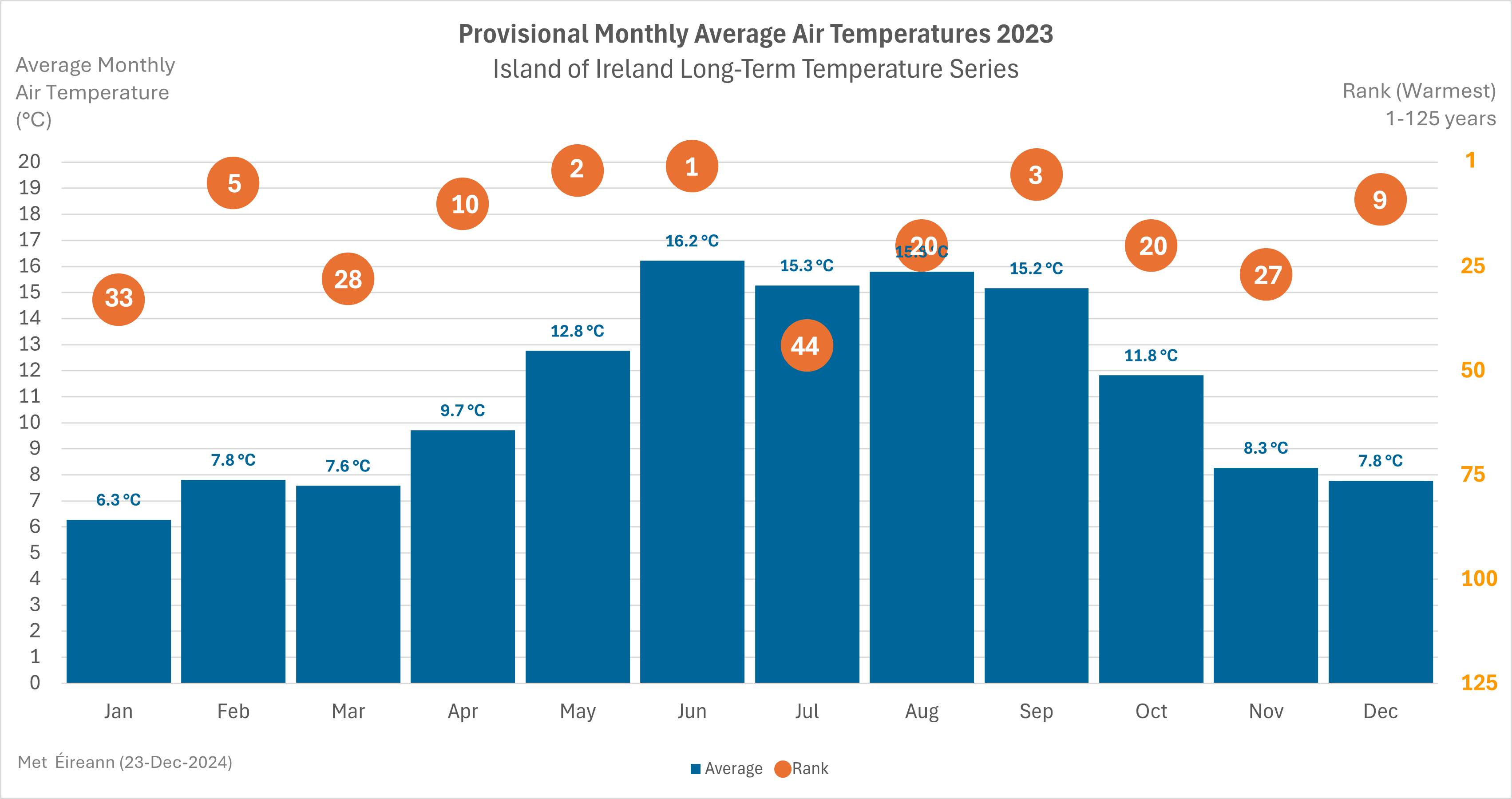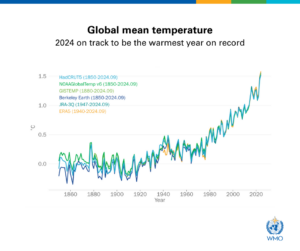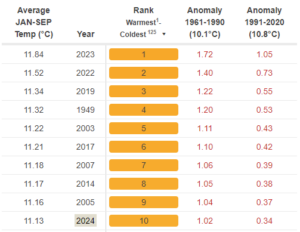Update issued Monday, 23 December 2024
December 2024 is expected to be around the 12th/13th warmest December on record (length 125 years), and average around 7.6 °C. Most months in 2024 were cooler than their respective months in 2023, therefore 2024 is not the warmest-year for Ireland and 2023 remains Ireland’s warmest-year on record. However, 2024 will be among the warmest years on record for Ireland.
At the moment, the five warmest years (warmest first) were 2023, 2022, 2007, 1945 and 2006. We expect 2024 to nudge 1945 down the list. This means that is very likely that the four warmest years on record will all have occurred within the last 18 years. At the moment, seven of the ten warmest years have occurred within the last 20 years.
As you can see in Figure 1 below, February, May (highest on record) and November in 2024 observed average monthly temperatures within their top 10 months respectively.

While 2023 (see figure 2 below) saw six months within its top 10 warmest months, namely February, April, May, June (highest on record), September, and December 2023.

Issued Monday, 11 November 2024
2024 is on track to be the warmest year on record across the world, according to the World Meteorological Organization (WMO) State of the Climate 2024 Update. Current Met Éireann data suggests it will be one of Ireland’s warmest year’s in 125 of records, but maybe not the warmest ever.
The WMO report, published on the opening day of COP29 in Baku, Azerbaijan, highlights an extended streak of exceptionally high monthly global mean temperatures that have pushed the global average temperature to 1.54°C above pre-industrial levels.
It goes on to outline how 2015-2024 will be the warmest ten years on record; how the loss of ice from glaciers, sea-level rise and ocean heating are accelerating; and how extreme weather is wreaking havoc on communities and economies across the world.
Among the other key highlights of the report is the fact that atmospheric concentration of carbon dioxide (CO2) has increased by over 50% from 1850 to 2024, reflecting how human activity is causing the atmosphere to trap more heat and drive observed changes in climate.

Figure 1: Annual global mean temperature anomalies (relative to 1850–1900) from 1850 to 2024 from six datasets. The 2024 average is based on data from January-September.
Despite the ‘Red Alert’ flagged in the report, WMO Secretary-General Celeste Saulo emphasises that “this does NOT mean that we have failed to meet Paris Agreement goal to keep the long-term global average surface temperature increase to well below 2°C above pre-industrial levels and pursue efforts to limit the warming to 1.5°C.”
Highlights:
- Jan-Sep 2024 global average temperature 1.54 (± 0.13) °C above pre-industrial level
- Long-term warming measured over decades remains below 1.5 °C
- Past 10 years are warmest on record and ocean heat rises
- Antarctic sea ice second lowest on record and glacier loss accelerates
- Extreme weather and climate events lead to massive economic and human losses
Provisional Irish Climate 2024 so far
2023 was the warmest and wettest year on record in Ireland with temperature records going back to 1900 and gridded rainfall records going back to 1941. The previous warmest was 2022.
The first half of 2024 continued very mild and wet but since June, we have seen a run of cooler and drier months. January, June, July and September were all cooler than average (when compared to the most recent long term average reference period of 1991-2020), with August closer to average. May 2024 was the warmest May in 125 years.
Since May 2024, only August saw above average rainfall, with the other five months coming in drier than average. If this continues, we could see one of our driest years, but with most of November and December remaining it is too early to call.

Table 1. Island of Ireland average January to September (inclusive) air temperatures and anomalies for 1961-1990 and 1991-2020
For media requests, please contact media@met.ie.
For climate enquiries, please contact enquiries@met.ie.